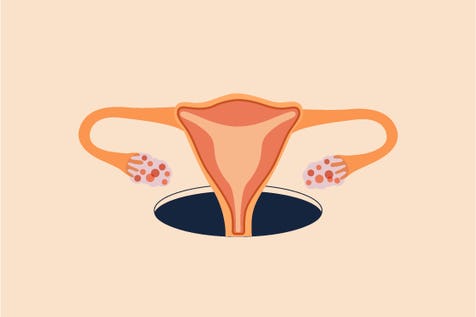Over the past decade, the development of femtech has provided women with accessible tools to better the agency they have over their bodies and reproductive health. Today, millions of users input their details, and disclose information about their sexual activity, menstruation dates, libido, mood and physical changes on a daily basis. It is in this way that predictions around ovulation not only help those wanting to become pregant, but also aid women in countries where their access to contraception or abortion is denied. By building a bank of personal information, a trusted app can help you better understand and manage your menstrual cycle. If combined with the information of millions of other women, such data has the potential to drive forward revolutionary research regarding women’s reproductive health.
As a user, the more information you provide, the better the predictions apps can make about your reproductive health and cycle. However, recent reports have shown how a number of Femtech companies are exploiting this personal information by selling their users data to third parties for marketing purposes (1). Not only does this behaviour break the trust of women, it can lead to insensitive marketing and the violation of privacy policies. This is something that inne takes very seriously and is extremely sensitive about, making sure that their users are safe, and that any data they share is not misused in any way. inne wants to make sure that users feel they are able to comfortably log intimate information for their own benefit, knowing that it will be kept private. This is based predominantly on tracking the level of progesterone in your body, as well as inputting information about your day-to-day mental and physical health.
It is important to be aware of how your data is used when using any apps, making sure to look into the company's privacy policies before fully trusting anything. With this in mind, we take a look at the regulations that inne has in place to make sure each user is safe and protected when sharing such intimate information
How data is used
Data refers to information that is collected for reference or analysis purposes. Online, we are often agreeing to the sharing of our data without a second thought, whether it’s accepting cookies on websites that track our web history, or sharing our location with social media apps. It is from these third party sites that brands can buy data and use the information to target consumers and better tailor their services and products to people. In this way, data is being stored, sold, and distributed, constantly. However, the importance of protecting sensitive information regarding health and fertility is something which companies have only had to adhere to since 2018 (2).
Within Femtech, data is gathered by users answering questions such as their age, menstrual patterns, body temperature, appetite and sexual activities. When gathered on a collective basis, this data has the potential to improve the understanding of, and better aid, female reproductive health on a global scale. Yet, the development of Femtech over the past 6 years, and the lack of regulations around data sharing, has predominantly been seen to benefit advertising companies. As the well known quote goes, ‘If you’re not paying for it, you’re not the customer; you’re the product being sold’; this sums up how many apps will make money from your use of their service; by selling your data to people who want to sell you something. When an app is a paid-for service, you are more likely to have less third-parties accessing your data.
The misuse of data in Femtech
With the ability to buy data regarding a woman's sexual activity, fertility and reproductive health, companies are able to target potential customers accordingly. This can range from underwear to contraceptives, egg donors to baby clothes. This is where the most recent scandal in the misuse of data has grown from. At the beginning of 2021, a woman’s health app with over 100 million users, claimed to keep select information of its users secret, noting it wouldn’t disclose details to third parties about cycles, pregnancy, symptom notes and other information entered through the app (3). However, over the course of three years, the app was found to be passing on certain intimate health details of its users to marketing and analytic companies such as Facebook and Google.
Such violations of privacy have led to women being fed adverts that cause more harm than good. Incidents have involved women who’ve experienced miscarriages or stillbirths being bombarded by adverts for baby and mother products. While internet platforms continue to reinforce dated ideas about women and their bodies through targeted advertisement, aided by data sold by Femtech companies. This can range from women feeling pressured to start having children once they turn 30, to looking a certain way while pregnant. This illustrates the moral obligation Femtech has to protect their users information from unhelpful marketing campaigns, as well as develop trust by being transparent about data use.
Laws to be aware of
To help manage and protect the ever growing world of Femtech and their users, new privacy laws have been put in place requiring companies to comply with how they use and gather data. In Europe, the enforcement of GDPR (General Data Protection Regulation) means that companies are required to obtain explicit permission before collecting or sharing sensitive personal information. Alongside this, there are regulations which secure anonymity around any data that is shared for scientific reasons or the app’s development. One way this is managed is having a user’s data and their identity stored on different servers, so a direct identity link is harder to source.
It is important to pay attention to privacy policies that are required to state what data is gathered, how it is shared, and what you can opt in and out of. As more demand for protection is applied, more pressure is being put on apps to install privacy policies such as: fingerprint login, clearer language of terms and conditions, and enabling users to turn off cookies and the sharing of data with third parties (4).
Inne’s Data Policy
The inne team is dedicated to making their users feel safe, so we asked them to expand on their own policies. They explained how inne uses the minimal amount of data necessary to provide its services and advance its products. This includes personal data (name, address, e-mail, telephone number, payment data, date of birth) so as to purchase the inne product. Inne also uses this personal contact data to keep users informed about product updates and their membership. If people consent to it, inne also might use it to share more relevant and tailored content and product offers via newsletters, in a way that sensitively caters more to the users’ interests.
Any health data such as hormonal measurements (tracking progesterone levels) and symptoms and conditions(which you can input optionally), is above all, used to provide the service of inne (monitoring and prediction) in an anonymized form, to advance the product. As a member of the team explains, “the strict rules of GDPR regarding processing of special category data are applied to inne’s processing of health data. When we use health data for research and product development, it is in an unidentifiable/anonymized form.”
inne achieves this anonymity by storing personal and health data separately from one another. Health data is stored and processed only on servers located in the European Union and, in accordance with GDPR, inne users have the right to access, correct, erase, restrict, and complain about the use of their personal data. And that regarding the right to erasure, the only limitations can come from legal obligations such as health and finance regulations or to establish, exercise or defend legal claims. Users can exercise their rights by contacting support@inne.io who will reply within a 30-day time frame (though usually much earlier).
When asked how inne shares data with third parties, they told us how “personal data like contact data or payment data are shared with third parties only to the extent that it is necessary to provide our services (for example, for shipping or payment)”. Inne does not sell any health data to, or share it with, third parties for marketing purposes.
Transparency creates trust
With the continual development of Femtech, it’s essential that women aren’t left feeling violated or worried about where their data is ending up. When data is used for research, it is important that the user gives her consent and that the data is anonymised. Making the language of services terms and conditions understandable is another essential part of how Femtech can improve its services. Although the laws and regulations controlling female health applications are going in the right direction, it’s important to challenge who is making those laws and how many female voices are involved in the decisions.
With apps such as inne leading by example, the power of Femtech is undeniable, but questioning who stands to benefit - the user or the investor - is something that will determine the real value of such developments in female health. Being mindful and exercising further control over your own data’s status is a step in maintaining the agency that these apps are born to provide.
References
-
https://techlawforum.nalsar.ac.in/data-exploitation-and-discrimination-through-empowering-femtech-apps/ Article consulted on 10th July 2021
-
https://femtech.live/data-privacy-how-femtech-should-be-thinking/ Article consulted on 12th July 2021
-
https://www.nytimes.com/2021/01/28/us/period-apps-health-technology-women-privacy.html Article consulted on 10th July 2021
-
https://www.consumerreports.org/health-privacy/what-your-period-tracker-app-knows-about-you/ Article consulted on 5th July 2021



